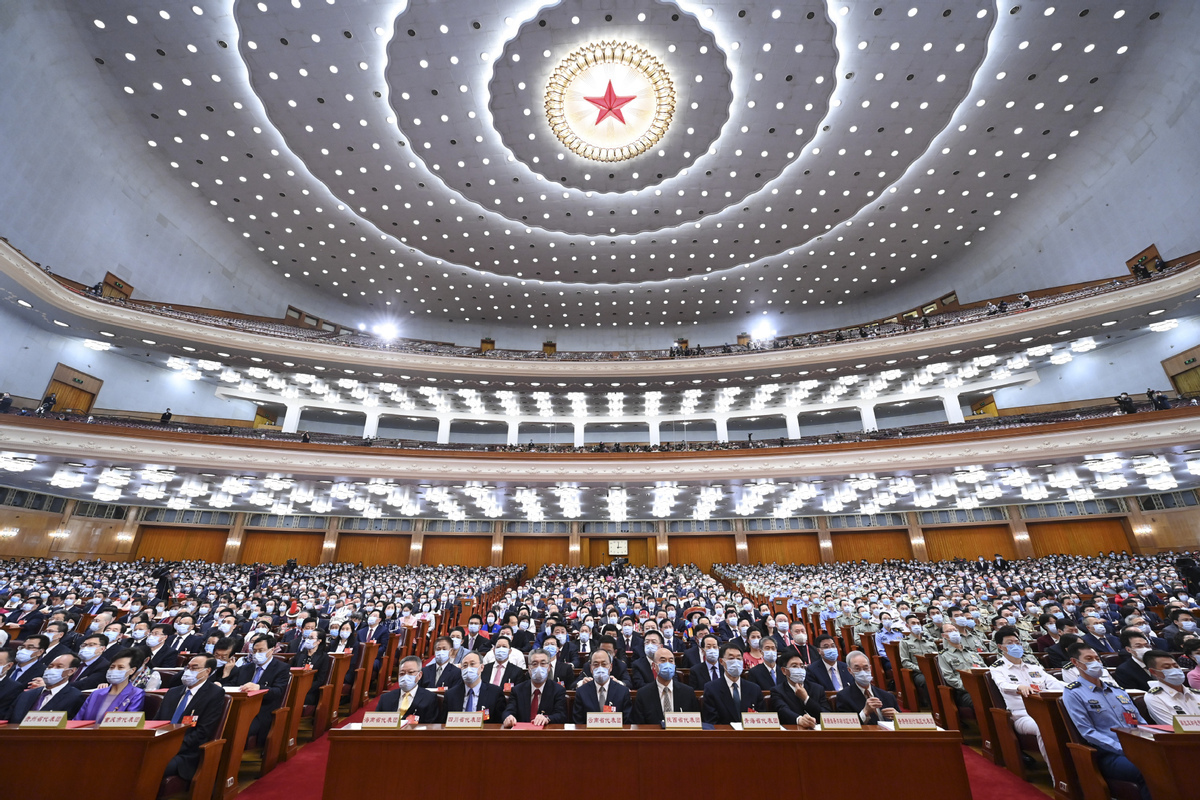Two sessions point to accelerating reform

The closing meeting of the third session of the 13th National People's Congress (NPC) is held at the Great Hall of the People in Beijing, May 28, 2020. [Photo/Xinhua]
The annual sessions of China's top legislature and political advisory body sent out the key message that the country will likely accelerate market-oriented reform and opening-up in the second half of the year to boost business vitality and economic development despite unprecedented uncertainties, officials and experts said on Friday.
The remarks made by President Xi Jinping and Premier Li Keqiang during the two sessions have shown that the top leadership has a clear understanding of the current situation, and the policies that have been rolled out are realistic and focused on not only addressing imminent challenges but also driving long-term social and economic development, they said.
While the government has decided not to set a GDP growth target for this year, there has been greater emphasis in the Government Work Report on protecting jobs, safeguarding people's basic living needs and ensuring the survival of businesses.
The premier said at a news conference on Thursday after the closing of the annual session of the National People's Congress that the announced economic policies are designed to provide vital relief to businesses and revitalize the market. He also said the country will continue to foster a market-oriented and world-class business environment governed by a sound legal framework.
"Our experience in the past 40-plus years of reform and opening-up shows that the greater difficulty we face, the more important it is for us to stick to reform," Li said. "Our measures are designed to help the vast numbers of market entities and are built around addressing their difficulties and concerns. This in itself is consistent with our market-oriented reform."
The central government has also rolled out large-scale fiscal measures to support economic growth and pledged further reductions in taxes, fees and corporate operating costs to mitigate the risks generated by the COVID-19 epidemic.
"The biggest challenge in implementing the policies is that the country is facing unprecedented uncertainties. That is why the central government has made special arrangements to ensure the funds are directly transferred to the local level and benefits go directly to the people," Sun Guojun, a senior official at the State Council Research Office who participated in the drafting of the Government Work Report, said at a news conference in Beijing.
In addition to the announced measures, the government will continue to deepen reform by reducing administrative intervention and expanding market access to create more development opportunities for businesses, which is crucial for creating jobs and boosting consumption and investment, Sun said.
"The backbone of this year's economic policy lies in deepening reforms to boost market vitality and internal development momentum, instead of simply relying on the government to stimulate growth," said Shao Yu, chief economist at Shanghai-based Orient Securities.
The recovery in economic activities in March and April points to the market's internal momentum bouncing back, while expanded government spending, focusing on supporting businesses and individuals, will help reinforce such resiliency, Shao said.
John Chen, president of Swiss Re China, said that the Chinese government's emphasis on deepening reform reflects its strategic direction of leveraging the benefit of market liberalization and structural reform to boost China's growth potential. He said he expects reforms to be accelerated in the second half of the year.
The government has also pledged to substantially reduce investment restrictions for foreign companies, which reflects the government's policy consistency and determination in promoting higher levels of opening-up, Chen said.
At Thursday's news conference, Premier Li said that addressing the challenges posed by the COVID-19 pandemic requires greater openness and further liberalization of trade and investment. The premier added that China will maintain its opening-up policy and introduce more measures to further open its vast market, unleash the country's consumption potential and import more foreign goods and services.
Zhang Xiaotao, dean of the School of International Economics and Trade at the Central University of Finance and Economics in Beijing, said the opening-up policy will also feature stepped-up efforts to align domestic rules with world-class practices, which will contribute to China's market-oriented and rule-based reforms.
"With continued efforts to promote globalization, China is expected to remain the steady engine of global growth and an immense market offering business opportunities to the world," Zhang said.










